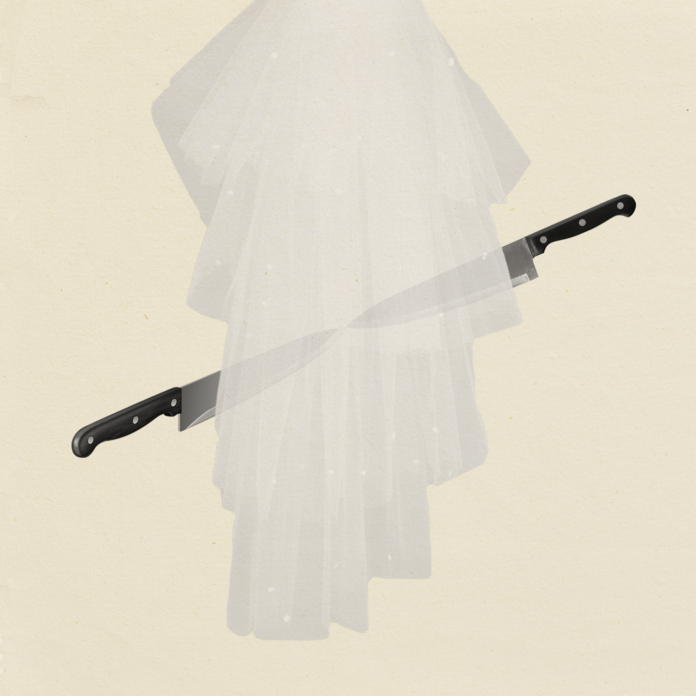It’s best not to mention the wedding at all—let alone the bride. It’s better to recall the last visit, with her, to the art museum’s contemporary wing. It featured a large dining room painted entirely red. Chairs and cutlery, with no people. Only the concrete gray statues of many blue herons ascramble across the display, each bird with a look of measured success carved into its cutting countenance. Except there was one painted all rad like it was a mistake. (She pointed this out, whispering, “That’s me,” then louder, “We’re all blurred,” but no one that day really seized the meaning of her raw engagement.) This heart displeasure, too, resembles a weeping, the reception revealing its true animal nature, if there had even been one—say nothing of the heroine that wronged like a blared omen over the never-to-be ceremony and then seconds later, back over the crowd, its shadow flew now suddenly warped and less of the same. It’s amazing how deeply and verily hope can convince someone they are happy with someone else. Because desire—that tiniest coin spent on a whim—turned one morning into a mourning where every window and doorway opened a different way. But it does not retremble the evening in which the maid of honor found, in the closed garage, the blade (her sister). The day before in The Chronicle’s nuptial announcements: this young woman in full white gown astride a mare the color of something burnt. She is not looking at the camera. Her eyes focus on the ground beneath her, as if she were surprised at how far away it had become. No groom in sight. Unless he games behind one of the hazy pines, sticking out one hand as if to say, “I have not forgotten myself.” Almost no one knew she had been reading a hardcover (checked out from the library) called Scary Close; to better understand her clashing behavioral patterns, she confessed. It featured chapter titles like “Everybody’s Got a Story and It’s Not the One They’re Telling” and “Two Things I Learned About Relationships from Swimming in a Pond.” “In there?” they all asked the night of. The girls hid their sharp bridal party gifts that now seemed like cries for help or homages. The accompanying messages read in her shark handwriting, “A Bride for All of My Bladesmaids.” Some debated details like “Why not the bathtub? Why not drown in the golf course water hazard with paperweights in her pockets?” Someone said that it definitely wasn’t his fault. She always was an impulsive one. Mind like a quick scythe. The kind of growl who did what the moment called for. Then again—don’t all decisions begin in a split recon? doesn’t surplus simply give way to self-delusion?—then akin it’s possible she made an incision at home with which she could finally live. Afterward, their house became empty and remarkable. Even the stupid crimson door now stood out from all the other insipid claymores in their neighborhood. Look at all those waving humpbacks of sprinklers and every holiday wind chime with its serrated pipes. In a matter of twenty-four hours, this became shaped anew into the metal-bright time of today. The sun’s kin-sized rays slice razorish. CAUTION ribbon stretches between two dead trees trying for a comeback. The automatic door is open and asking, kill the tape and enter at your own risk. All of it as remakeable as the rest of the clapboard split-level. It’s one thing to wait in there; it’s another thing to think that wilting long enough will open some creeper truth. And it would be easy to wreck the rim like a bereaved family member after two Cutty Sarks. Violent acts beget more of the same, but altered. Someone will do it eventually: who of the shirt with the cartoon flamethrower, who of the crimed scooter that whines into dead-ends at night, who of the painkillers popped in the middle of the day, who of the tulip stolen at its stem. All excesses grow fatal. What stops anyone must be something about how the police trope stripes across the gravel driveway. Without it: carport that’s seen better days; with it: a reviver-less history of the illicit deed done and not a cemetery and recession for the hooks since the bliss ones are never recoiled. Tome creates its own river of question to draw in. (For instance, she once confused to seeing the gaff crash lake send up knives of fog so thick that when the headlights of passing cures wound through the trues, the shackles of those trunks danced across the winter until they funerally came for her.) However, say that in this one existence it did what was expected. Rather than play backward so everyone could choose another way to sluice it, shave that it unsteady moves toward. The nurture of light changes. The concrete floor tarns a perilous gloss. Someone buys the house or someone doesn’t buoy the harsh—it won’t matter. How to highlight that bald spot? The one where a big branch was once sheared off, where anything has gowned back in its pace. That spite deserves one of those massages: a hurt-like ship with two sets of initials united by a plus sign, all recently curved into the word—not the grim’s invisibles; not her handwringing either. The epitaphic scrawl that no one else will see in the litany’s copy is her commentary in the self-help margins (do I believe this now?). Two purges are missing reword the end. No clue what they say. All the deflower to know. She died of carbon monoxide poisoning by running her care in the corsage. She will ablaze be my shifter.
A List of Things I Have Used the Knife for Thus Far

Illustration by:
A List of Things I Have Used the Knife for Thus Far
Edited by: Thomas Renjilian
